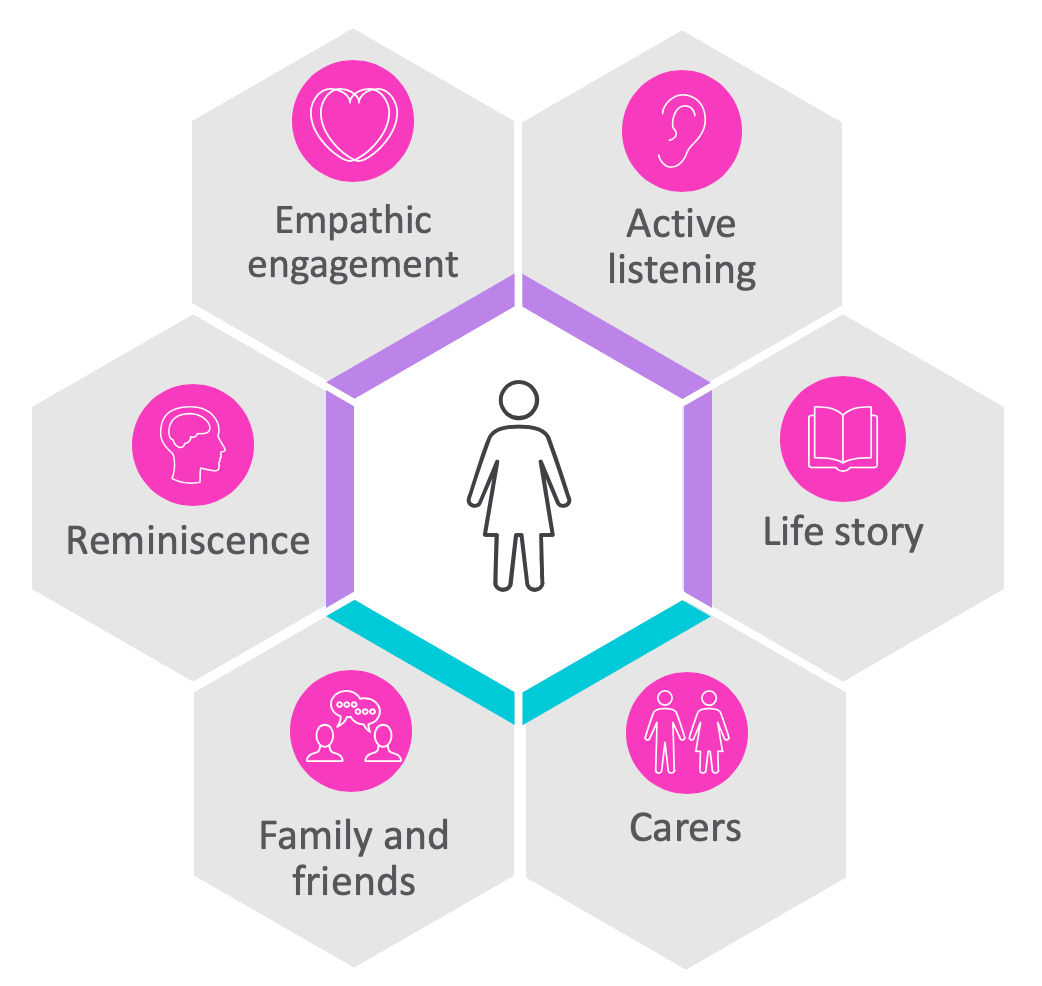Transforming the lives of people living with dementia and their caregivers
Reminiscence
To enhance the life of the person with dementia (whose short-term memory is a diminishing resource), we need to focus on their long-term memories. These can help us understand who they once were – and thus, who they are now.
Empathic Engagement
Feeling connection and understanding, then showing sensitivity and compassion for a person with dementia requires mature self-awareness. Empathy fosters good social behaviours, so it is also vital for effective team working.
Active Listening
It’s surprisingly rare for people to listen well to one another when interacting. It isn’t always easy to give anyone our full attention – to be ‘fully present’, but it is crucial to every good relationship with a person with dementia.
Life Story
Our life experiences shape and influence who we are. For a person with dementia, for whom loss is ever-present, sharing life experiences through their timeline can improve their sense of self-esteem and help us care for them more authentically.
Communication driven by
REAL Relationships
PLACING THE PERSON WITH DEMENTIA AT THE CENTRE OF CARE
We constantly strive to improve the experience of any person living with dementia, by delivering the finest communication products and workshops for caregivers
REAL Communication is an essential part of any good caring relationship, designed to help create meaningful, caring connection.
REAL Communication helps put people at ease. It encourages trusting and empathic relationships with those being cared for as well as other carers, friends and families.
REAL Communication focuses on the person. It supports their dignity, reduces their anxiety and helps them to feel known, valued and positively cared for.
What our clients say
Senior Carer
Residential care home
“I find I listen more intently to what people are saying now. The framework has helped me to have a deeper understanding of how it feels to live with dementia now, so I can relate to those I care for, better.”
REAL Communication Framework
LEARN NEW Strategies for improving care
The REAL Communication Framework places the person with dementia at the centre of care.
The thinking behind REAL began in 2009, it is now helping to drive change and transforming dementia care.
Developed over ten years’ experience of the challenges of engaging meaningfully across the generations, which included caring for and working with people living with dementia in different settings and also through monthly volunteering for the charity Contact the Elderly (now Re-Engage) for 28 years.
Using the REAL framework in everyday situations, helps carers to deliver a more normalised and enjoyable quality of life for an older person with dementia, while supporting the resilience of those around them.

REAL Communication Framework
LEARN NEW Strategies for improving care
The REAL Communication Framework places the person with dementia at the centre of care.
The thinking behind REAL began in 2009, it is now helping to drive change and transforming dementia care.
Developed over ten years’ experience of the challenges of engaging meaningfully across the generations, which included caring for and working with people living with dementia in different settings and also through monthly volunteering for the charity Contact the Elderly (now Re-Engage) for 28 years.
Using the REAL framework in everyday situations, helps carers to deliver a more normalised and enjoyable quality of life for an older person with dementia, while supporting the resilience of those around them.

And some of the REAL benefits
The individual qualities of the REAL framework are both related and inter-dependent. All offer benefits, both individually and together. Reminiscence naturally leads to life story sharing. When active listening and empathic engagement are present, the person sharing their story feels more valued, nourished and understood. Our greater understanding of the person builds respect and helps us to care for them in more nuanced ways. This strengthens the relationship and makes it more interesting, more involving – and easier to sustain.
REMINISCENCE
There is a complex relationship between our ‘self’ and memory. Psychologists suggest that our personalities are supported by recounting life stories based on our autobiographical memories. Our very sense of identity depends on our being able to recall our personal history as narratives, which provide unity and a sense of purpose for us over our life course.
EMPATHIC ENGAGEMENT
The advantages of empathic engagement (emotional empathy) include greater awareness of another person. When we ‘tune in’ to another person in a concerned, relational way, we are more able to perceive their emotional state, and be alive to their underlying state of mind. By ‘reading between the lines’ of what they are communicating, we can feel greater affinity and togetherness.
ACTIVE LISTENING
Active listening has many nourishing benefits in all our relationships. Active listeners are more likely to create trust and rapport with others – when our ‘inner voice’ is relatively quiet and distracting thoughts are set aside, it is easier for us to focus exclusively on the needs of the person, or people speaking.
LIFE STORY
Life story and reminiscence are closely linked. Shared stories allow us to get to know a person’s life story which in turn, helps us improve our communication and gives us a richer understanding of their needs and wishes, ensuring that care is provided in a positive and person-centred way. It lifts a person’s mood – enabling them to share their experiences
REAL at work
Want to know more?
We welcome the opportunity to tell your more about our services
